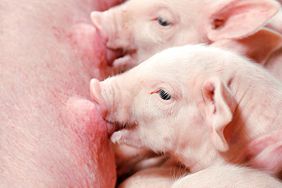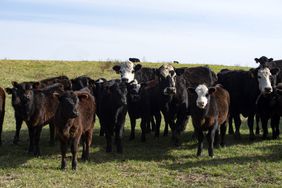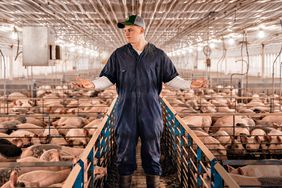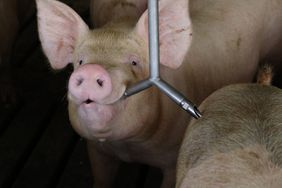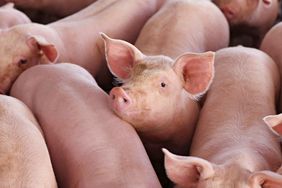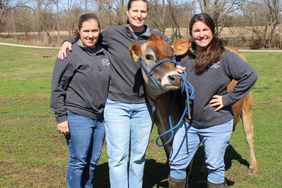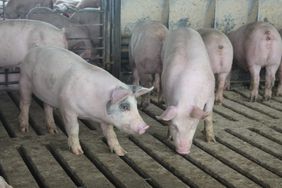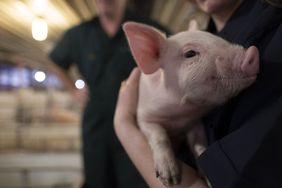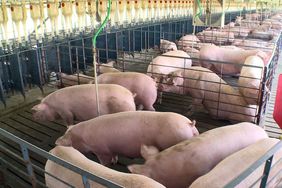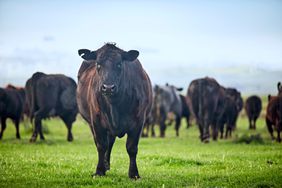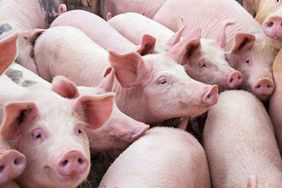:max_bytes(150000):strip_icc()/Screenshot2023-09-26at1.10.23PM-e8186749436f443cbdf471e43f254e23.png)
Darrell Hoemann/Investigate Midwest
In January, subscribers to the American Society for Nutrition’s email Listserv received an ad from the National Pork Board. The organization, which promotes the pork industry, wanted funding requests for research that would help “advance understanding” of pork’s role in “healthy diet patterns” and as an “environmentally sustainable protein.”
The NPB is one of dozens of “checkoff” programs that help advertise agriculture commodities, such as milk and soybeans. It has funded at least $17 million in land-grant university research over the last decade — more than any other checkoff, according to agriculture research grant data.
But that research has at times been criticized for prioritizing the industry’s biggest players. In 1999, a federal investigation found the checkoff had only been awarding grants to the National Pork Producers Council, a lobbying organization that represents the largest producers.
“I understand that they’re doing a lot of good research with their dollars and that sort of thing,” said John Gilbert, who has raised hogs on his family farm in Iowa Falls, Iowa, for more than 20 years. “Unfortunately, very little of it tends to apply very much to what we do.”
When asked about concerns that small producers were not represented in the research that the checkoff funded, Jason Menke, the checkoff’s spokesman, did not directly address the question.
“Our research priorities are determined by pork producers with the necessary input and guidance from key experts on the environment, human and animal nutrition, and animal health and welfare,” he said in an emailed statement.
Anna Dilger, a professor in the animal sciences department at the University of Illinois and who has worked on projects funded by the pork checkoff, said the checkoff does still consider independent producers and that some of their main research focuses are relevant to all pork farmers, like nutrition and disease prevention.
“This isn’t about putting more money in Smithfield’s or other companies’ pockets,” she said. “This is really about supporting the work of the entire U.S. swine industry.”
In addition to research, checkoffs also advertise for specific commodities. Checkoffs funded the ubiquitous “Got milk?” campaigns that featured celebrities with milk mustaches, as well as “Pork: The Other White Meat.” Producers largely fund checkoffs, and pork producers send $0.35 for every $100 of pigs sold to the checkoff.
ARIA, an organization focused on corporate accountability and climate change, compiled the data on research funding from 41 land-grant universities through publicly available nonprofit tax forms and by filing public records requests.
The group’s data shows that, between 2012 and 2022, the pork checkoff gave $17,184,763 in funding to land-grant colleges across the country. More than half went to research at Iowa State University, which is located in the state that produces the most hogs in the U.S.
“Iowa State University engages in research that benefits all kinds of pork producers,” Carolyn Lawrence-Dill, the associate dean for research and discovery at Iowa State University’s College of Agriculture and Life Sciences, said in an email. “In general, our work is pre-competitive in nature, meaning it advances methods for pork production generally, not any one producer or producer type.”
Park Wilde, a professor of food and nutrition policy at Tufts University, said, in general, choice of research topics should be held at an “arm’s length from funder interests.” He said the pork checkoff reached out to him but he wasn’t interested in its funding.
He said funders have ways to screen for certain research. For instance, the pork checkoff’s ad in the nutritionists’ Listserv asked researchers to submit letters of intent for funding.
“This gives the funder a lot of information about the researcher’s favorable tone,” Wilde said. If the pork checkoff likes the letter of intent, the researcher "might get asked to submit a formal research proposal.”
:max_bytes(150000):strip_icc()/Screenshot2023-09-26at1.11.02PM-d49215341acb4bd5b3a6ef88599521b9.png)
Talia Duffy - Source: ARIA
Some farmers don't feel represented by the checkoff's research
While the pork checkoff is supposed to represent the industry as a whole, certain groups believe the research incentives are tied to the commercial pork industry.
The National Pork Board’s members, according to its website, include some producers with smaller operations and others with thousands or millions of pigs. Several hold positions in large agribusiness companies or previous affiliations with the National Pork Producers Council, a lobbyist group.
Joe Maxwell, the former Missouri lieutenant governor and a spokesperson for farmer-led advocacy group Farm Action, said a lot of checkoff-funded research applies to concentrated animal feeding operations, or CAFOs, which larger operations use.
“The research has been captured by the biggest meat companies,” Maxwell said.
Many of the pigs produced in the U.S. come from major producers so the largest hog farmers fund most of the checkoff.
“It's the old adage of follow the money,” Gilbert, the Iowa Falls farmer, said. “Their money's coming from the millions of pigs that are getting produced in industrial confinement, and so that's who they're serving.”
Researchers acknowledge criticism, but say all can benefit
Researchers who have received grants from the pork checkoff said they’re aware of the criticisms.
“We've heard this stuff for years,” said Robert Knox, an extension specialist in swine reproduction at the University of Illinois. “I think that's always going to be there.”
The pork checkoff has research integrity guidelines that guide their process for selecting projects to fund.
“We evaluate the proposals based on their merits and how closely they align with the needs of the checkoff from a research standpoint, at a given moment,” Menke said.
:max_bytes(150000):strip_icc()/Screenshot2023-09-26at1.12.03PM-31143b12948542cda6f27705ecb62442.png)
Talia Duffy - Source: ARIA
Research questions like the value of locally produced pork or consumer interest in pork at farmers’ markets will see less interest from the checkoff, said Wilde, the Tufts professor.
Lee Johnston, a professor of swine nutrition and management at the University of Minnesota and who has worked on checkoff-funded projects, said he has heard the complaints from small farmers. But, he said, there are realities to the research that they may not consider.
“University researchers — any research group — cannot replicate every possible environment to match an independent farmer’s farm,” Johnston said. “But (then the question becomes) what can you learn on your small farm from that and adapt on your farm?”
Better communication could close the gap, checkoff researchers say
Gabler thinks one cause of the divide is a communication issue. He is leading a new project — funded by National Pork Board grants — called the Real Pork Trust Consortium that he said aims to improve scientific communication.
“Communicating research results is obviously a priority,” Menke said in an email. The pork checkoff encourages publication in journals, hosts webinars, works with extension educators, communicates with state associations, and posts findings on the checkoff website, he said.
Producers who are looking to address a specific issue could reach out to their nearby university extension offices or their state pork producer associations, which are affiliated with the pork checkoff, Knox said. He added that, if the issue is reported from multiple sources, the National Pork Board would take interest in what serves the producers.
Gilbert said he would pay more attention if he saw evidence of the checkoff addressing issues he cares about.
“Everybody's just probably to the point where they say, ‘We're just not going to pay any attention to them, they don't matter anymore,’” Gilbert said. “I always get the feeling that everybody considers what our farm does is not big enough or not anything to be concerned about.”
How Investigate Midwest analyzed the data
ARIA, a group focused on climate change, provided Investigate Midwest with the data of grants given to land-grant universities for agricultural research. Alex Park, a researcher and journalist, compiled the dataset through public record requests and nonprofit tax forms. (The data was used for a story by TIME magazine, as well.)
Python was used to clean and filter the data. If there was no value in the "amount" column — meaning the amount given by an organization to a land-grant university — the row was deleted. Only about 1,400 rows, out of a dataset with more than 23,000, were deleted in this step.
The data was cleaned to only examine the years 2012 through 2022. Some universities in the dataset had older and more recent data, but the most complete data was available for this decade.
This story was originally published by Investigate Midwest, which is an independent, nonprofit newsroom. Its mission is to serve the public interest by exposing dangerous and costly practices of influential agricultural corporations and institutions through in-depth and data-driven investigative journalism. Visit online at www.investigatemidwest.org
